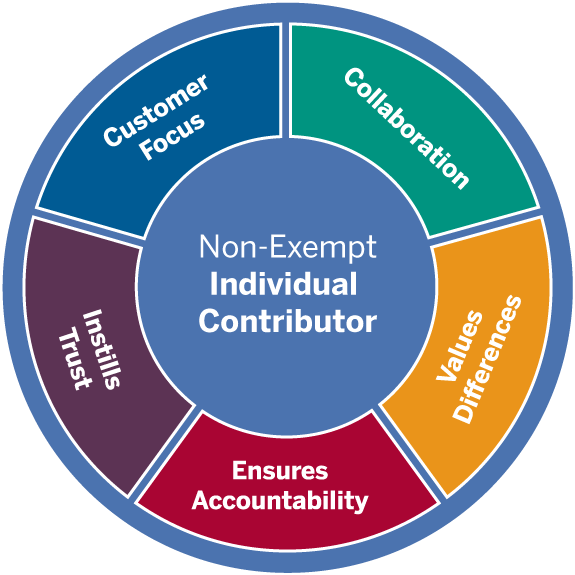Non-Exempt Individual Contributor: Mastery
Self-Development
Actively seeking new ways to grow and be challenged using both formal and informal development channels
The bottom line is those who learn, grow, and change continuously across their careers are the most successful. The skills someone has now are unlikely to be enough in the future. Becoming a lifelong learner isn’t just a catch phrase. Being committed to self-development means you look for ways to build the skills you will need in the future, and you look to grow from experience. Challenge yourself. Learn from others. Development is a personal commitment that you choose to make.
You show this competency when you:
- Show personal commitment and take action to continuously improve
- Accept assignments that broaden capabilities
- Learn from new experiences, from others, and from structured learning
- Make the most of available development resources
How to develop this competency:
Change your mindset
Some people are not natural learners. They are more performance oriented: get the job done and move on. Performance-oriented people tend to avoid new situations where they may fail. Natural learners are less worried about how they will be perceived by others. To them, the learning is the outcome. You can train yourself to be a learner, but you must be willing to expand your horizon. Be curious. Continuously look for opportunities to stretch yourself. View each situation as a learning opportunity.
Become reflective
People who are good at self-development build time into their schedule to develop from experiences. They seek to achieve results but also look to learn and grow from situations. After each experience—whether a project or new challenge—reflect: What went well? What didn’t go well? What could you have done differently to achieve a better outcome? What skills were you lacking? Take your learning and put it into practice next time. Use your experience to help drive your future growth. Don’t rush to the next task; plan to reflect.
Show others you take your development seriously
State your development needs and ask for their help. Don’t stop at asking for feedback. Ask people for their help in your development. Can they act as a coach or mentor? Pick a person in the organization who is known for their strength in the area that you’d like to develop. Observe what they do and how they do it? Can they teach you a new skill? Get to know other advocates at and away from work. Utilize a variety of people to help you develop the skills you are looking to grow.
Learn more:
- Article: How to Set Personal Development Goals for Work
- Video: TED: The Power of Emotional Intelligence
- LinkedIn Learning: Self Development course collection

Non-Exempt Individual Contributor
- Core Competencies
- Demonstrates Self Awareness
- Being Resilient
- Self-Development
- Resourcefulness
Foundational
Intermediate
Mastery
